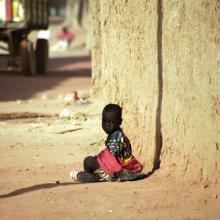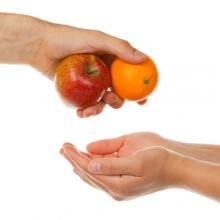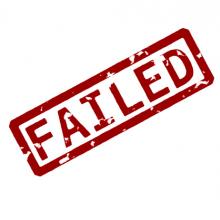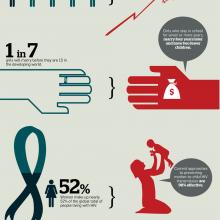Hunger
When I go home for Christmas, I always end up pulling out the old Christmas songbook from inside the piano bench and working my way through while my mom cooks dinner. I don’t really read the music as much as I read the chords and play by ear. Good King Wenceslas is a beautiful song musically, but is one of the most fun songs to play because of the never-ending chord changes.
I never really considered what the song was about, being raised in a school system that taught of the tyranny of monarchies and the Revolutionary War. Medieval leaders ruled in an age of knights, castles, and oppressed peasants. But then there was Wenceslas (who I now know was the Duke of Bohemia).
Joey Ekburg, Executive Director of the North Park Friendship Center, was never one to mince words. “We pay almost twice the amount for food, and we have more clients than ever before.” It took awhile for the words to sink in and the math to play out in my head. I was never great at math, but the implications were pretty obvious.
I looked over at the people sitting near the entrance, waiting to pick up food to make it through the week. I wondered what would happen if this food pantry were to run out of food or if the unthinkable were to happen — the Friendship Center suddenly shutting its doors.
The Albany Park neighborhood in Chicago has served as an entry point for generations of immigrant families, including my own. Many of them come to America looking for a fresh start. Sometimes that search becomes reduced to finding a fresh meal.
Editor's Note: This is part two of a three-part series from Dr. Miroslav Volf an a voice instructing us how to involve our values into our present politcal debates. To read part one go HERE. From part one:
In this year of presidential elections, I have decided to summarize key values that guide me as I decide for whom to cast my vote. ...
6. The Poor
Value: The poor — above all those without adequate food or shelter — deserve our special concern. (“The moral test of government is how it treats people in the dawn of life, the children, in the twilight of life, the aged, and in the shadows of life, the sick, the needy, and the handicapped” [Hubert Humphrey].)
Rationale: “When you reap the harvest of your land, you shall not reap to the very edges of your field, or gather the gleanings of your harvest; you shall leave them for the poor and for the alien: I am the LORD your God” (Lev. 23:22). “There will, however, be no one in need among you, because the LORD is sure to bless you in the land that the LORD your God is giving you as a possession to occupy” (Deut. 15:4).
Debate: There should be no debate whether fighting extreme poverty is a top priority of the government. That’s a given. We should debate the following: How should we generate a sense of solidarity with the poor among all citizens? In poverty alleviation, what is the proper role of governments and of individuals, religious communities, and civic organizations? What macroeconomic conditions most favor lifting people out of poverty? What should the minimum wage be?
Questions to Ask: Is overcoming extreme poverty (rather than fostering the wellbeing of the middle class) a priority for the candidate? For what poverty-reducing policies is the candidate prepared to fight?
Peacemaking happens in many forms. Sometimes peace is offered to others, and sometimes given in unexpected ways.
It was early morning. The African sun had yet to rise above the mountains, and the sky was the soft yellow of newly shucked corn.
“Beep, beep,” sounded the horn on the old truck as it rumbled to a stop in front of my house. My old friends – Momadu, Madu, and Balamusa – greeted me with smiles, waves, and morning blessings.
We were on our way from Kenieba, a small town in western Mali, to Sitaxoto, a large village about two hours away over a broken dirt road.
A church was there, a little group of people who met each week outside under a big baobab tree to pray, study the Bible, share their stories and ask, “How do we follow Jesus?”
Food assistance programs have been helping millions of people get through the recession. With poverty remaining at record high levels, we should be grateful that these resources are available to protect families from hunger.
Unfortunately, some of our nation’s elected officials see it differently. New legislation (H.R 6518) introduced by Congressman Paul Broun and members of the Republican Study Committee targets some of the very programs designed to protect the most poor and vulnerable. Under the proposed legislation, six food programs administered by the federal government would be combined into a single block grant to states.
Does that sound like Washington slang? What it means is that spending on food programs would be dramatically reduced, administration of these programs would be shifted to state governors, and benefit level would likely vary from state to state. Programs such as the Supplemental Nutritional Assistance Program (SNAP) and Emergency Food Assistance (TEFAP) would be threatened by this legislation.
It’s the time of year when various government agencies release their reports for the previous year, in this case, 2011. The annual report on poverty is due from the Census Bureau next week, and, according to AP, early reports are that
“The ranks of America's poor are on track to climb to levels unseen in nearly half a century, erasing gains from the war on poverty in the 1960s amid a weak economy and fraying government safety net.”
This week, the U.S. Department of Agriculture released its annual report on household food security. (If you want all the detailed statistical tables, here is the full report.) Not surprisingly, the results showed a growing number people in the U.S. going hungry. 17.9 million households (14.9 percent of households) were “food insecure.” That means at some point during the year, those households did not have enough food due to lack of money. Of those, 6.8 million households (5.7 percent of households and one-third of all food-insecure households) had “very low food security.” That means at some point during the year, some household members went hungry. According to their answers on the survey, these folks reported that “the food they bought just did not last and they did not have money to get more,” and that “an adult had cut the size of meals or skipped meals because there was not enough money for food.”
It is hardly the time to reduce assistance to hungry families, but as McClatchy News noted,
“The survey data comes as congressional Republicans … push for massive cuts in food stamp-program funding to curb enrollment growth and to help balance the federal budget. The Democratic-controlled Senate also voted in June to cut food stamp funding, but by a smaller amount.”
Without programs such as SNAP (food stamps) school lunches, the Women, Infant and Children nutrition program; there would be many more food insecure families in America.
Here’s the data in a helpful infographic from McClatchy.
I don’t mind failing as much as I do admitting I’ve failed. And technically, we haven’t blown the SNAP Challenge just yet, but I know for a fact we will by the end of the week.
I went to the store last night for another loaf of bread and a frozen pizza for dinner, which I had promised my kids if they’d make it to mid-week without freaking out. This brought us down to eighteen bucks and change left in the till, which theoretically was going to be enough to fill in the gaps for other items we’d need to do our meals through the weekend.
And then reality hit.
I’m not making friends among my family members with this challenge.
Because it was my idea to do this for a week (living on the equivalent budget of food stamps for seven days), everyone ends up coming to me to “check on the rules.” Basically, this means they ask me about ways they might work around the limitations of the challenge, and then get mad at me when I don’t give them a way out.
Yesterday ended up being a mixed bag. My wife, Amy, and I had to go to the other side of town for some errands, and it didn’t occur to either of us that we’d be gone over lunch time. Fortunately, one of the errands was at an Ikea, a giant housewares store that’s known for it’s affordable cafeteria-style meals, so we made it work. But even with their reduced-rate prices, we spent more than $9 for both of us and little Zoe to eat.
“Man,” I said, looking at my empty bowl, previously filled with pasta and Swedish meatballs, “that was way less than we usually spend going out, but it was still almost double what we have in the budget for one meal.”
THE MOTTO OF RADICAL FAITH always is “now—or never.” If we can’t find divine grace reaching out to us in the here and now, just where we are, then we will never find it. We won’t find it by merely dwelling on the stories and legends of divine interventions in the past. For centuries, the fourth gospel has made people uneasy because it heightens the tension between those who think of religion as loyalty to what has been handed down for us to repeat and those who are prepared to see God right before them and with them now. This month we are asked to immerse ourselves in the very tense sixth chapter of John’s gospel, in which Jesus provokes bafflement and resentment by daring to appropriate to himself the mystique of the manna, the bread from heaven given by God to sustain the Israelites on their journey through the wilderness.
Everyone knew what the bread from heaven was. It was something miraculous embedded in legends of yesteryear, wasn’t it? Quite apart from being scandalized by Jesus’ apparent delusional egomania, the people are unsettled by the way he wrests the whole theme of being fed by God from its safe mummification in legend and miracle, and plants it in the immediate here and now. He forces the question about whether we dare acknowledge our own pangs of hunger for the eternal, and whether we are prepared to receive—eat and drink—the living person of Christ as the gift that will satisfy that hunger.
Every day, millions of children go hungry. But it doesn't have to be that way.
- Hunger is the world's No. 1 health risk, causing more deaths annually worldwide than AIDS, malaria and tuberculosis combined.
(Source: World Food Program) - One in seven people in the world will go to bed hungry tonite.
(Source: World Food Program) - There are more hungry people in the world (925 million) than the combined population of the United States, Canada and the European Union (841 million)
(Source: World Food Program)
Find out about the causes of hunger — and the solutions — in a new video from World Vision Australia (with music by Gotye) inside the blog...
A common rationalization those in religious circles make for cutting social programs that help the poor is that church should be the one helping “the least of these,” not the government. But if we know that’s not possible given the church’s means, that millions will get left behind because our efforts fall far too short, is that still a logical line of defense? Jesus told us to care for the poor, sick, and vulnerable—he didn’t prescribe how.
Sometimes Jesus healed people one-on-one. Sometimes he addressed the needs of a multitude by providing enough food to feed them all. Sometimes he sent others in his stead to provide healing.
If we ignore the needy in our midst by getting rid of one huge way to address that need, we are not following Jesus’ example.
Looking for a last-minute gift for Fathers Day or a graduate?
How about doing something for someone else in honor of your loved one?
Give a gift that helps the poorest of the poor feed their families, earn a living, protect themselves from disease or educate their children.
Inside the blog, find several suggestions of unique gifts that keep on giving.
In a room filled with African heads of state, captains of industry, leaders of international development and countless executives from NGOs at the G8 Symposium on Global Agriculture and Food Security in Washington, D.C. late last week, stood one Irish rock star — Bono, the lead singer of U2 and co-founder of the ONE Campaign.
At first blush (to the uninitiated, perhaps), Bono's presence might seem incongruous, but most of the folks in the room at the Ronald Reagan building a few blocks down Pennsylvania Avenue know the Irishman more for his tireless humanitarian efforts than his closet full of Grammy awards. For more than 25 years, Bono, 52, has been involved deeply and effectively in international affairs as a champion for the poorest of the poor.
"Can we manage the oil as well as the farmland? Manage it properly, responsibly, transparently?" Bono asked the audience. "Because when we don’t, you know what happens. Hundreds of billions of dollars got lost to oil and gas corruption in Nigeria. That’s what the watchdog groups are telling us. Just mind blowing. Huge numbers.
"Crops need sunlight. So does resource extraction. Both need sunlight’s disinfecting glare. Isn’t transparency the vaccine to prevent the worst disease of them all? Corruption. Everybody here knows that corruption kills more children than HIV/AIDS and malaria combined. So that’s what I want to leave you with. That very simple word. That very simple concept. Easy to say. Much harder to realize, especially in law. The word 'transparency.'
"We won’t have food security without it," he said. "But we will have oil riches without it but those riches will be held and hidden by very few hands."
Today: As Jesus is traveling around, crowds gather, important leaders want him to come speak in their beautiful churches; all are eager to hear the teacher’s wisdom. Suddenly, as far as the eye can see, there is a huge crowd of children slowly coming toward them. Some are trying to walk, some are crawling, some are being carried. Most are stunted — their bodies and brains haven't developed properly because of a lack of food, and the necessary protein, vitamins, and minerals it provides. All of them — 2.6 million every year — are slowly dying from malnutrition.
A lot changes in 50 years.
In 1962, people didn’t have the internet, a cell phone, a microwave oven and many probably didn’t yet have a color television set. JFK was president and no one had been to the moon yet. Steve Jobs hadn’t even invented anything yet – he was only 7 years old.
But one thing that remains is USAID. 2012 marks the agency’s 50th anniversary, and its commitment to global political, economic and social development has been sustained since its foundation in 1961.
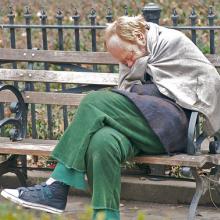
"Homeless and Cold" in New York City's Lincoln Square, 2010. Image via Wylio http://bit.ly/t8fOzE
There are times when a story in the news just makes one stop with a righteous indignation.The news I heard today that one in two Americans is now classified as poor makes me angry.
This means half of the people living the richest nation in the world are poor. Is this the American exceptionalism we want?
I am angry because this is a not necessary. I am angry that so many people are suffering, while our elected officials are playing games, unable or unwilling to do what is necessary to promote the general welfare of the nation.
Policy-Making Billionaires, Poverty In The Midst Of Plenty: Hunger Persists In The United States; The Religion Of An Increasingly Godless America (OPINION); Evangelicals Flocking Toward Newt Gingrich; Rev. Jackson Calls For New War On Poverty; Improving Social Justice Indicators Will Create A Better U.S. (OPINION); Is The Black Church The Answer To Liberal Prayers?; Catholic Charities' Human Trafficking Program Loses Federal Funds; Air Force Academy Adapts to Pagans, Druids, Witches and Wiccans.
Some 15 years ago, my aunt and uncle gave me the gift of goat for Christmas.
Let me rephrase: They didn’t give me an actual goat, but they donated a goat — in my honor — to a village in the developing world.
At age 15, I was less than pleased. The plight of starving children and the needs of my indigent brothers and sisters around the globe were far too serious and far too abstract for my selfish teenage brain to wrap itself around.
Today, though, I find myself in the ironic position of wanting to buy goats, mosquito nets, and other items as Christmas gifts in honor of my own family members. This causes me to look back on my selfishness as a teen and see how blind I was to the idea of grace — to the beauty and significance of my aunt and uncle’s gift.
I believe that there is a basic human dignity inherent in work. In fact, the Bible even makes special provisions to provide jobs for those who otherwise wouldn’t have one. But, when it comes to the messy legislative process, no one can claim God’s special favor on a particular bill. It is, however, appropriate to discuss what kind of moral principles legislation should try to promote.
In St. Paul’s second letter to the Thessalonians, he writes, “Those unwilling to work will not get to eat." Paul goes on to warn about those who are idle and the negative effect they can have on a community. It was essential that every person work for their own well-being and for the health of the entire community.
Hard work was praised by early Christians, but so was ensuring that every person was provided for. Acts 2 says “All the believers met together in one place and shared everything they had. They sold their property and possessions and shared the money with those in need.”
These passages could be pitted against one another. One side argues for strict capitalist principles in which the lazy starve. The other models a communal society that shares and redistributes private property. But understood properly, they actually work together.

Less than one percent of the federal budget goes to foreign aid. Our spending on development and foreign assistance is not -- by any stretch of the facts or imagination -- our national debt.
Cutting foreign aid programs will do little to get us out of debt, but would be a devastating setback in the fight against global, extreme poverty.



